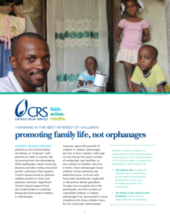This document, published by Catholic Relief Services, urges members of the Catholic faith community to consider the best interests of the child when partnering, or “twinning” with parishes in Haiti and undertaking charitable activities. “Twinning,” says the report is the practice of Catholic congregations, or parishes, in the United States partnering with parishes in Haiti and providing support, money, resources, and volunteers to those parishes. These activities often include directing resources toward children in orphanages in Haiti. The problem with this support, says Catholic Relief Services, is that about 80% of children in Haitian orphanages are not actually orphans, meaning they have at least one living parent or guardian. These children (the exact numbers of whom are unknown) enter orphanages for other reasons, primarily extreme poverty.
While in the orphanages, the children suffer worse outcomes than their non-institutionalized peers, including poor health, developmental delays, and challenges with emotional attachment, as well as abuse and difficulty reintegrating into communities. What’s more, these orphanages have become sources for child traffickers. Catholic Relief Services, therefore, recommends that parishes who are looking to partner with communities in Haiti first consider the types of projects they want to take on, and should consider working with local NGOs or faith-based organizations that help families provide for their children, rather than those that institutionalize them. For those churches and parishes that are already supporting orphanages, Catholic Relief Services suggests holding those orphanages accountable and ensuring that they meet minimum national standards.

